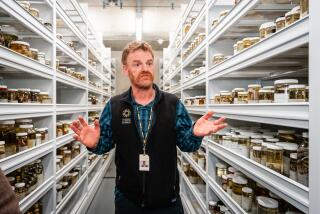Ionis shares leap 30% after a drug trial goes so well, it ends early
An experimental drug for an incurable, often fatal infant disease has performed so well that a clinical trial was halted ahead of schedule, development partners Ionis Pharmaceuticals Inc. and Biogen Inc. announced Monday.
Shares of Carlsbad, Calif.-based Ionis soared 30.2% to close at $38.01.
Biogen has paid Ionis a $75-million licensing fee for the drug, called nusinersen, Ionis Chief Executive Stanley T. Crooke said. The Cambridge, Mass., company’s shares rose 4.1%.
Biogen plans to file for approval by the end of the year. Crooke said results from the Phase 3 trial were based on an interim analysis agreed to with regulatory agencies in advance.
The infants exhibit symptoms of Type 1 spinal muscular atrophy, the most severe form of a rare genetic disease that impairs movement. Those who got nusinersen achieved significantly better motor milestones than those who didn’t get the drug, Crooke said.
All of the roughly 120 infants in the double-blind study can move to an ongoing open-label study of nusinersen. There is no placebo in that trial: Every patient gets the drug. Patients in the control section of a Phase 2 study can also get nusinersen.
Approval would be a dramatic indication of the effectiveness of Ionis’ drug technology, called antisense, in an incurable disease. People with Type 1 SMA get supportive care, but no drug on the market can affect the underlying course of the disease.
“We’ve seen good safety, no significant side effects,” Crooke said. “The improvement seems to continue with prolonged treatment.”
The only option
Spinal muscular atrophy occurs in about 1 out of 6,000 to 10,000 births. It’s caused by mutations in a gene that reduce production of a protein needed for survival of movement-controlling spinal neurons.
Nusinersen increases production of the protein from a closely related gene by altering how RNA made from the gene is translated into protein. This is done with antisense technology, a field pioneered by Ionis.
Drugs based on antisense technology are meant to block or change how targeted genetic instructions delivered through RNA affect the making of proteins, which are the building blocks of life. For instance, they could block certain mutations from resulting in protein synthesis that causes an unwanted medical condition.
Nusinersen has been granted orphan drug status in both the U.S. and the European Union — indicating it shows promise in treating a rare disease or condition — and it’s designated for fast-track review in the United States.
Ionis and Biogen have been extensively testing nusinersen, both in blind and open-label studies. The companies formed their alliance in 2012.
See the most-read stories in Business this hour >>
Evidence to act
In double-blind trials, neither patients nor doctors know who is receiving the drug, thereby minimizing the chance of bias.
But in rare instances when evidence of efficacy is sufficiently strong, a blind trial can be halted so all patients can benefit. And in Type 1 SMA, this is literally a matter of life and death.
Infants with Type 1 SMA can’t sit or hold up their heads, and they progressively lose what movement ability they have. Death typically occurs before 1 year, often due to respiratory failure, unless the infant is placed on a ventilator.
Milder forms of SMA exist, with Type 4 the mildest. These people have varying degrees of movement difficulties but can have a normal or somewhat reduced lifespan. Ionis and Biogen are also testing the drug in patients with Type 2 and Type 3 SMA.
Other studies of nusinersen are to continue as planned.
Nusinersen is the product of research by Ionis, which partnered with Biogen because of that company’s expertise in commercializing neurological drugs.
Crooke said the pace of research and development was unusually rapid, taking just six years from the program’s start to nearing the point of filing for marketing approval.
Biogen will handle regulatory and commercialization functions; Ionis will complete its Phase 3 studies and give Biogen assistance. Biogen also said it plans to launch a global expanded access program to get nusinersen to patients with Type 1 SMA.
Background
Ionis, formerly called Isis Pharmaceuticals, previously received much attention for its drug Kynamro, which treats high cholesterol caused by a severe genetic disease. Kynamro was approved in January 2013.
But Ionis, which had developed the drug with partner Genzyme, took it back under an option in January of this year. Ionis said the drug had not been marketed effectively and could do better.
In May, Ionis sold Kynamro to Kastle Therapeutics for up to $95 million, along with royalties beginning in 2017.
Both Kynamro and nusinersen target rare diseases. However, a competing drug to Kynamro is on the market, while there is no alternative to nusinersen.
MORE FROM BUSINESS
German company plugs into L.A. area for its electricity storage operation
Closing the Bank of Mom and Dad
Looking for work? Airlines will need 617,000 pilots over next 20 years
UPDATES:
4:05 p.m.: This article was updated with information about antisense technology.
This article was originally published at 3:45 p.m.
More to Read
Inside the business of entertainment
The Wide Shot brings you news, analysis and insights on everything from streaming wars to production — and what it all means for the future.
You may occasionally receive promotional content from the Los Angeles Times.










